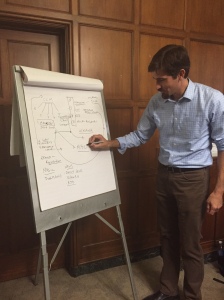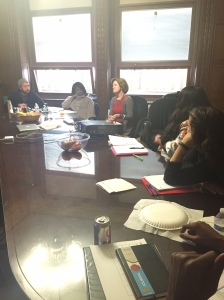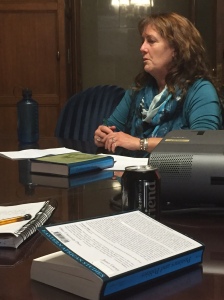As we approach our departure for Tanzania next week, we reflect on the skills we have learned through reading and conversation over the last month. Our class was fortunate to welcome academic experts on the history, culture, and politics of Tanzania, who shared their insights and experiences in the field. In the process, students got to share their research questions and get advice and recommendations from field-specific experts. But these conversations also shed light on the research process itself. Through these meetings, students moved from questions about how to shape research subjects to how to actually conduct fieldwork and analyze data.
Anthropologist and ethnomusicologist Alex Perullo, a professor at Bryant University, spoke to students about the role of social media in shaping the parameters of political debate in contemporary Tanzania. His conversation drew on his own book, Live from Dar Es Salaam, as well as Steve Feierman’s Peasant Intellectuals. In the process, he laid out the basic actors and organizations that define contemporary Tanzanian politics, as well as the major issues that shape political debate in the country.
Historian Jamie Monson, who is the director of the African Studies Center at Michigan State University, talked with students about the way she came to the research subject of her most recent book, Africa’s Freedom Railway, and the way in which the research for that book generated new projects, including a documentary film. Through her own fieldwork experiences, Jamie illustrated the importance of intimate experiences in research and encouraged students to allow themselves to be immersed in the world around them. Personal connections, she argued, help make evidence meaningful and allows stories to be told and seen. Embracing context pushes us to pay attention to detail and seek to understand the reality in front of us rather than comparing those experiences with what we are familiar with in the US. In the case of Jamie’s research, technology stories were also social stories, local stories were also stories of global connection. In explaining the way that this manifested in her own work, Jamie encouraged us all to think about the ways in which seemingly small stories can index much bigger processes.
Historian Laura Fair, a professor of African History at Michigan State University, visited our class to discuss her book, Pastimes and Politics. Laura’s work raised a number of provocative questions about the meaning and practice of politics in the island of Zanzibar and in Tanzania more broadly. She encouraged students to approach their research interests in a similar way that they would conduct research in a setting with which they were more familiar, like Detroit. Students identified a number of research strategies, which they hope to employ in the field in Dar Es Salaam. But we also discussed some of the difficulties and risks associated with those strategies and the kind of sensitivity necessary to conduct research, observe communities, or have conversations with unfamiliar populations. Laura also used this kind of comparative approach to get the students to think about the meaning of democracy, and the different meanings of “politics” in American and Tanzanian contexts. She highlighted that the Swahili word for democracy, demokrasia, is an English loan word–a foreign concept that does not resonate with local values. Instead, Laura suggested, politics had multiple meanings that often defy our expectations. In her experience on Zanzibar, for example, the kind of local “politics” that she was interested in differed significantly from the experiences and practices and history evoked by the literal Swahili translation of “politics”. She encouraged students to look at local categories and to investigate local meanings instead of assuming definitions. Doing research along these lines requires that you not assume that you know what is important. Research, rather, requires working with and listening to local people in order to ascertain what they think is important.
We are looking forward to putting these practices into action when we arrive in Tanzania next week. While 10 days may not be enough time to complete a research project, the experiences that students gain can help shape the research that they conduct in Detroit, and provide vital context that will inform their analysis and interpretation of evidence.
We’re very grateful that we could speak directly to such a distinguished group of scholars with such long and rich experiences in Tanzania. We look forward to debriefing with anthropologist Brad Weiss upon our return in early November, when he will help us process some of those experiences.






Hello,
Checked out your Facebook page!
LikeLike